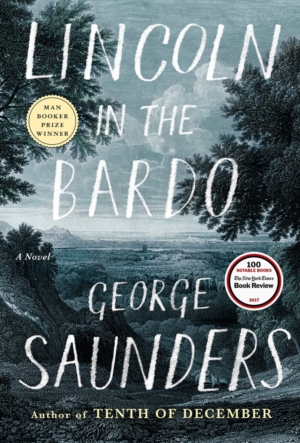
February, 1862. As music plays downstairs for the Lincolns’ party, “Willie” Lincoln lies in bed in the White House, slowly succumbing to a sudden fever. His father, tormented by the loss of his young son, begins to visit Willie’s body after it is laid to rest in the churchyard. What Lincoln doesn’t realize is that a crowd of departed souls is watching him—from a waiting place known as the Bardo—and moved by the love that is shown to the boy who has left the living world outside the iron gates. Thrown into action by the chance of returning to society, if through the grief-stricken Lincoln, the host of the ghostly figures attempts to bring about his intervention in their present circumstances, while reminiscing about the lives they left behind.
Touted as historical fiction, George Saunders’s debut novel pushes forward a new form of alternate history in its exploration of the afterlife. Much like a play, the novel is made up of exchanges of dialogue, where characters’ voices overlap with each other and events taking place. More striking is Saunders’s use of historical and pseudo-historical excerpts to paint a portrait of life during the 1860s and the diverse opinions formed around Willie’s death, the Civil War, and Lincoln himself. This creates a fluid narrative, and one that is as much fantasy as it is history. While I found the mix of fact and fiction a little jarring at first, and potentially misleading, over the course of the book it became effective as a new kind of speculative genre, quite different from historical fiction proper.
Lincoln, ever larger than life in the American psyche, is here made slightly closer to us through his obsessive grief for his son Willie. The imagery of Lincoln holding his decaying son could not be more shocking, although as seen through the eyes of our ghostly guides—a chatty duo named Roger Bevins, III, and Hans Vollman—we are led to view it as a moment of catharsis rather than pure tragedy. As for Willie, acceptance of death comes more easily, in spite of his longing to be with his father in life. Willie’s resignation to his place in the Bardo, stuck between life and death, is something that he takes for granted, and as described in Saunders’s excerpts, he takes it rather stoically, like a much older person.
Unlike Willie, most of the inhabitants of the Bardo are discontent with their placement and seemingly interminable waiting. Much of the book revolves around these characters lamenting their past lives and lingering desires, in a particularly grating pseudo-Victorian voice. While an effort to mimic 1800s dialect is understandable, the attempt in this book comes across strangely, vaguely reminiscent of Dickens but too twee and expository to be authentic.
Saunders places his would-be side characters center stage, but his devices for generating empathy are peculiar. The driving motive of nearly every one of his ghost-characters focuses around sexual fantasies and escapades, described in great detail. I grew quickly tired of reading about body parts and bedroom scenes verging on soft porn; it did little for the character development and was extremely uncomfortable to read between very serious depictions of Abraham Lincoln’s grief. I am not particularly a Lincoln fan, but this treatment felt actually disrespectful.
But what of Lincoln, and Willie, and the historical elements?
There were opportunities in this book to delve deeply into the character of the president, religious views on death, and race relations. Unfortunately, while Saunders makes a nod to each of these subjects, he substitutes his fictional characters’ emotional-sexual drives for any real exploration of the bigger topics. We learn that people in the 1800s had different impressions of Lincoln’s appearance and personality—interesting, but not original. We see an existential crisis in the person of Reverend Thomas, who does not understand why he, who has always tried to lead a faithful life, is stuck in the Bardo instead of in Paradise. (Rather cruelly, Saunders never resolves this question.) There are several black characters, but sadly these individuals remain cliched “types” rather than fully developed characters, and their appearances seem more of an afterthought than a key to the story. One chapter of the book describing the slaughter of the Civil War contrasted with Willie’s death is particularly strong, but Saunders does not build upon this moral dilemma to any satisfactory conclusion. Readers looking for a thorough commentary on the Civil War or Lincoln’s leadership will be disappointed.
Finally, there is the Bardo itself: the transitional spiritual world where souls go after death and before rebirth, according to Buddhist belief. The trouble with Saunders’s Bardo is that it mixes in elements from Christianity, including questions of the nature of God and visions of divine judgment. If Bardo is a real place—the premise of the novel—then why go into questions that would be irrelevant? This loose rendering of Buddhist and Christian beliefs, mixed together in a weird, ill-defined setting, is poised to offend people of both religious backgrounds and leave unbelievers disturbed.
On that note—while this book seems written for those unused to (or uncomfortable) thinking about death, I cannot recommend this book to anyone who is. Even as someone who is unconcerned about dying, I thought the book was depressing. Some vague redemption is offered to Lincoln, but the other characters—those actually residing in the Bardo—are plagued by anxiety, confusion, lust, and bitterness, only briefly relieved when they come together for a moment to help Willie. Even while God is firmly depersonalized in the narrative, a heavy sense of Fate is substituted. If one approaches all writings about the afterlife as speculative, Saunders’s is, in any case, the least compelling.

Leave a comment